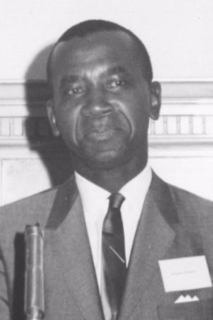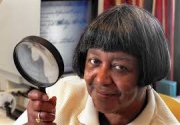Related Research Articles

The National Archives and Records Administration (NARA) is an independent agency of the United States government charged with the preservation and documentation of government and historical records. It is also tasked with increasing public access to those documents which make up the National Archive. NARA is officially responsible for maintaining and publishing the legally authentic and authoritative copies of acts of Congress, presidential directives, and federal regulations. NARA also transmits votes of the Electoral College to Congress.

The Daughters of the American Revolution (DAR) is a lineage-based membership service organization for women who are directly descended from a person involved in the United States' efforts towards independence. A non-profit group, they promote historic preservation, education, and patriotism. The organization's membership is limited to direct lineal descendants of soldiers or others of the Revolutionary period who aided the cause of independence; applicants must have reached 18 years of age and are reviewed at the chapter level for admission. The DAR has over 185,000 current members in the United States and other countries. Its motto is "God, Home, and Country".

William Hendrick Foster was an American left-handed pitcher in baseball's Negro leagues in the 1920s and 1930s, and had a career record of 143–69. He was elected to the Baseball Hall of Fame in 1996. Foster was the much-younger half-brother of Rube Foster, a Negro league player, pioneer, and fellow Hall of Famer.

Prince Hall was an abolitionist and leader in the free black community in Boston. He founded Prince Hall Freemasonry and lobbied for education rights for African American children. He was also active in the back-to-Africa movement.
Prince Hall Freemasonry is a branch of North American Freemasonry for African Americans founded by Prince Hall on September 29, 1784. There are two main branches of Prince Hall Freemasonry: the independent State Prince Hall Grand Lodges, most of which are recognized by Regular Masonic jurisdictions, and those under the jurisdiction of the National Grand Lodge. Prince Hall Freemasonry is the oldest and largest predominantly African-American fraternity in the nation.

James Berton "Bert" Rhoads served as fifth Archivist of the United States. He was born in Sioux City, Iowa. Rhoads received his B.A., in 1950, and M.A., in 1952, from the University of California at Berkeley. He earned his Ph.D. in History from American University in Washington, DC in 1965.
Donald Lines Jacobus, FASG (1887-1970) of New Haven, Connecticut, was widely regarded among genealogists as the dean of American genealogy.

Edward C. Papenfuse is the retired Maryland State Archivist and Commissioner of Land Patents.
The Afro-American Historical and Genealogical Society (AAHGS) is a Washington, D.C. based organization which pursues scholarly and educational work on the genealogy and history of African American citizens. It was founded in May 1977, with James Dent Walker serving as its first president. Other founding officers included Marcia Jesiek Eisenberg, Marsha M. Greenlee, Paul Edward Sluby, Sr., Debra Newman Ham, and Jean Sampson Scott. It currently serves 34 state chapters and a chapter for the District of Columbia, and it is a member society of the Federation of Genealogical Societies.
James Campbell "Jimmy" Isaminger was an American sportswriter for newspapers in Philadelphia, Pennsylvania, from 1905 to 1940. He played a major role, along with Hugh Fullerton and Ring Lardner, in breaking the story of the Black Sox scandal in 1919. In 1934, he was elected president of the Baseball Writers' Association of America. In September 1940, Isaminger suffered a stroke while attending a baseball game at Municipal Stadium in Cleveland. He retired after the stroke.
George Andrews Moriarty Jr. (1883–1968), called G. Andrews Moriarty in most of his published work, was an American genealogist from Newport, Rhode Island. He was born in Newport on February 14, 1883, the only son of George Andrews Moriarty and Mary Ann Sheffield. His ancestor, John Moriarty, emigrated from Ireland in 1777 and settled in Salem, Massachusetts. George attended St. George's School in Newport, and then did his undergraduate work at Harvard University where he earned an A.B. in 1905, cum laude. He then attended Christ Church College in Oxford, England where he specialized in historical studies, following which he returned to Harvard to earn an M.A. in 1907.
Malcolm Henry Stern was an American rabbi, historian, and genealogist. Through the work he did that supported secular genealogical communities and resources, as well as created what is the structure and backbone of current Jewish genealogical societies, Stern's efforts created long-lasting, far-reaching cooperative organizations. For these reasons, Stern has been described as the dean of American Jewish genealogy.

Dr. Sara Dunlap Jackson was an American archivist. She was one of the first African American employees of the National Archives and Records Administration in Washington, D.C., where she specialized in military history.

Harold Thomas Pinkett was an African-American archivist and historian. In 1942, he became the first African-American archivist employed at the National Archives of the United States. He was also the first African-American to become a fellow of the Society of American Archivists and to be editor of the journal The American Archivist. He was an expert in agricultural archives, and served as president of the Agricultural History Society.

Agnes Kane Callum was a genealogist known for her research into Maryland's African-American history. She was a founding member of the Baltimore Afro-American Historical and Genealogical Society, a frequent columnist for The Catholic Review, and the founding editor of a black genealogical journal, Flower of the Forest. Callum was inducted into the Maryland Women's Hall of Fame in 2014.
Wilda D. Logan is an American archivist who is most well-known as her work of almost 40 years in the archival profession including 33 years of federal service with the Records Management Training Program of the National Archives and Records Administration (NARA). She is a member of the Society of American Archivists (SAA), Mid-Atlantic Regional Archives Conference (MARAC), National Association of Government Archives and Records Administrators (NAGARA), and is a Certified Archivist with the Academy of Certified Archivists (ACA), where she served as a Regent from 1991-1994.
Ervin L. Jordan, Jr. is an Associate Professor and Research Archivist at the University of Virginia, Albert and Shirley Small Special Collections Library. He has published several books and articles, as well as given lectures and taught workshops, on the American Civil War and African American history. He has appeared on television several times as a consulting historian in matters of African American history and genealogy, as well lectured at conferences, universities and events, some which were televised on C-CPAN. He has written several books and been awarded for his research in the Civil War and African American history and is one of the leading figures in developing black American history.
Clifford L. Muse, Jr. is an African American historian and archivist. He is currently Howard University's Archivist and Associate Director at the Moorland-Springarn Research Center. He is most well known for his involvement in the diversity issues of the archive profession as well as his research and writings on Dr. Martin Luther King, Jr. and Frederick Douglass.
Dr. Walter B. Hill, Jr. was a scholar, historian and archivist. He worked with the Smithsonian and the National Archives for 30 years, and wrote and edited for many academic journals. He was an advocate of diversity in archives and specialized in African American history. He is most well known as the consulting historian for the film, Glory, which earned heavy praise on its historical accuracy. He was featured as a special speaker for several conferences and events throughout his career. He frequently appeared on C-SPAN to discuss historical topics and controversies, especially topics pertaining to the American Civil War, African American history, and slavery.
Florence Edwards Borders was an American archivist, historian, and librarian. She specialized in the preservation of African American historical artifacts, especially Afro-Louisianans.
References
- 1 2 3 4 5 "James Dent Walker Elected to National Genealogy Hall of Fame". National Genealogy Society. Retrieved September 25, 2019.
- 1 2 3 4 5 6 "GENEALOGIST JAMES D. WALKER DIES AT AGE 65". The Washington Post. Archived from the original on 2019-09-25. Retrieved September 25, 2019.
- ↑ "James Dent Walker". www.aagsnc.org. Retrieved 2016-10-11.
- ↑ "WHO WAS JAMES DENT WALKER?". Afro American Historical and Genealogical Society. Retrieved September 25, 2019.
- ↑ Ross, Rod (2016-02-10). "James D. Walker: Lone Messenger to International Genealogist". Prologue: Pieces of History. NARA. Retrieved 2016-10-11.
- ↑ "National Genealogical Society Hall of Fame Members, James Dent Walker, Elected 1999". National Genealogical Society. National Genealogical Society. Archived from the original on 23 May 2015. Retrieved 13 October 2016.
- ↑ "National Genealogical Society Hall of Fame Members, James Dent Walker, Elected 1999". National Genealogical Society Hall of Fame Members. National Genealogical Society. Archived from the original on 23 May 2015. Retrieved 13 October 2016.